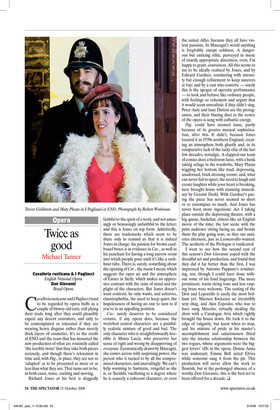Twice as good
Michael Tanner
Cavalleria rusticana & I Pagliacci English National Opera Don Giovanni Royal Opera
Cavalleria rusticana and I Pagliacci tend to be regarded by opera buffs as a couple of blowsy old tarts, still plying their trade long after they could plausibly expect any decent customers, and only to be contemplated or tolerated if they are wearing heavy disguise rather than merely thick layers of cosmetics. It’s to the credit of ENO and the team that has mounted the new production of what are routinely called ‘the terrible twins’ that they take both pieces seriously, and though there’s relocation in time and, with Pag., in place, they are not so ‘adapted’ as to be presented as more or as less than what they are. That turns out to be, in both cases, tense, exciting and moving.
Richard Jones at his best is doggedly faithful to the spirit of a work, and not amusingly or bemusingly unfaithful to the letter; and this is Jones on top form. Admittedly, there are trademarks which seem to be there only to remind us that it is indeed Jones in charge: his passion for brown cardboard boxes is in evidence in Cav., as well as his penchant for having a long narrow room into which people pour until it’s like a rushhour tube. There is, surely, something about the opening of Cav., the music I mean, which suggests the open air and the atmosphere of Easter in Sicily, which makes an oppressive contrast with the state of mind and the plight of the characters. But Jones doesn’t want contrast, he only wants, and achieves, claustrophobia, the need to keep quiet, the hopelessness of having no one to turn to if you’re in an appalling position.
Cav. surely deserves to be considered verismo, if any opera does, because the wretched central characters are a painfully realistic mixture of good and bad. The only character who is straightforwardly horrible is Mama Lucia, who preserves her sense of right and wrong by disapproving of everyone. Economically drawn by Mascagni, she comes across with surprising power, the person who is turned to by all the compromised characters, and unavailingly. We can’t help warming to Santuzza, vengeful as she is, or Turiddù, vacillating to a degree where he is scarcely a coherent character, or even the suited Alfio, because they all have violent passions. In Mascagni’s world anything is forgivable except coldness. A dangerous but enticing ethic, purveyed in music of exactly appropriate directness, even, I’m happy to grant, coarseness. All this seems to me to be ideally realised by Jones, and by Edward Gardner, conducting with intensity but enough refinement to keep sneerers at bay; and by a cast who contrive — surely this is the apogee of operatic performance — to look and behave like ordinary people, with feelings so vehement and urgent that it would seem unrealistic if they didn’t sing. Peter Auty and Jane Dutton are the protagonists, and their blazing duet in the centre of the opera is sung with cathartic energy.
Pag. could have seemed tame, partly because of its greater musical sophistication, after this. It didn’t, because Jones located it in 1970s northern England, creating an atmosphere both ghastly and, in its comparative lack of the tacky chic of the last few decades, nostalgic. A clapped-out team of comics does a bedroom farce, with a hunk taking refuge in the wardrobe, Mary Plazas wiggling her bottom like mad; depressing, unadorned, brick dressing rooms; and, what can never fail to upset, the need to laugh and create laughter while your heart is breaking, here brought home with stunning immediacy by Geraint Dodd. With Gardner’s pacing the piece has never seemed so short or to encompass so much. And Jones has never been more ingenious: Act I taking place outside the depressing theatre, with a big queue, backchat, almost like an English movie of the time; the last scene with the prim audience sitting facing us, and beside them the play going sour, so that our anxieties alternate, just as Leoncavallo wanted. The aesthetic of the Prologue is vindicated.
I went to see how the second cast of this season’s Don Giovanni coped with the dreadful set and production, and found that they did it far better than the first. I was impressed by Antonio Pappano’s conducting, too, though I could have done without some of his fond lingerings. The more prominent, warm string tone and less rasping brass were welcome. The casting of the Don and Leporello is easily the most brilliant yet: Mariusz Kwiecien an irresistibly sexy thug, and Alex Esposito, who was to have sung Masetto, virtually stealing the show with a Catalogue Aria which rightly brought the house down. He took it to the edge of vulgarity, but knew when to stop, and his mixture of pride in his master’s accomplishment and salaciousness fitted into the intense relationship between the two rogues, whose arguments were the biggest lovers’ tiffs in the opera. Donna Anna was undercast; Emma Bell acted Elvira while someone sang it from the pit. This production will never allow the work to flourish, but in the prolonged absence of a worthy Don Giovanni, this is the best we’ve been offered for a decade. ❑










































































 Previous page
Previous page